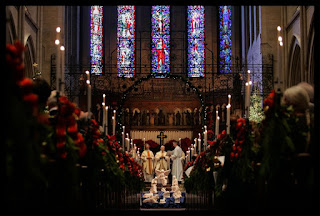Alright, as promised for the maybe 3 readers who consistently read my blog, here's my post about Christmas traditions in Japan.
I
decided to write on this topic because of the tens of classes Id been
asked to give on the opposite topic, Christmas in Canada. The more I
taught about it, the more perplexed my students seemed and I realized
that this was because their customs were completely different to ours. I
mean, sure, they celebrate Christmas, but they celebrate it in the most
curious way. Like anytime they adopt Western culture, they celebrate
Christmas in an attempt at Westernism that is so amazingly Japanese.
Because of this, I’ve made a list of my top five Japanese Christmas
traditions.
5. Christmas Cake
For
some reason unknown to me, Japanese people buy cake to eat on Christmas
Eve, whether it be with their families or friends. And not just any
kind of cake. In general, the cake is a very special white sponge cake,
covered with whipped cream and strawberries. It’s like strawberry
shortcake, but in actual cake form. In fact, I actually got to make this
with some of the san-nensei Home Economics students before I went home
for the holidays. It is delicious!
4. Dating
For
many young Japanese people, Christmas is seen as a dating holiday. Many
young couples go out on super romantic dates, and profess their love to
each other, or whatever people do on dates. I haven’t been on one in a
while, so I kind of forget. I’m also unsure of how this tradition
started, but I know that many Japanese women get quite upset when they
are single on Christmas. The poor things.
3. One-way Gift Giving
Apparently,
since the Western idea of Christmas is relatively new in the country,
they have adopted some practises but not others? Japanese parents tend
to give their children gifts, but the children are not expected to give
any back. Also, I don’t think they give anyone else gifts, just their
kids. And only until they are the age when they stop believing in Santa
Claus. Because like in Canada, the parents ARE Santa. Sorry, kids.
2. The complete absence of Religion
One
of the most perplexing parts of these Christmas rituals is that
according to the very scientific completely scholarly source of
Wikipedia, less than one percent of Japanese people are Christian. The
main religions are Buddhism and Shintoism. Because of this, many
Japanese children think that December 25th is the birth of Santa, not
Jesus, and even more people don’t even realize that Christmas in other
parts of the world has a religious origin.
1. KFC on Christmas.
This
has got to be one of the best things about Christmas in Japan. I know
I’m a vegetarian, so I shouldn’t be repping this, but many Japanese
people eat Kentucky Fried Chicken on Christmas. This tradition has
become so popular that many KFC chains offer special Christmas packages.
Once again, I’m not entirely positive how this tradition started, but
from what I understand, it is all part of an advertising campaign done
by KFC back in the 1970s, when they started promoting the idea that
Christmas = Kentucky. This was done because apparently one group of
expats realized that in the absence of turkey, fried chicken was the
next best thing. Obviously, KFC capitalized on this possibility and the
trend grew and grew, being adopted by the Japanese people as an
essential part of Christmas in Japan.
So
yeah, that’s Christmas in Japan! Next time, I may or may not write
about something more relevant to my life. We’ll see how I feel.





I think for many people in Canada Christmas isn't a religious holiday either - it has become a cultural holiday here which for many people has nothing to do with religion. While people here are aware of the religious origin and some (or lots of) people do still celebrate it as a religious holiday, it has become more than just a religious holiday. People of many different beliefs choose to celebrate Christmas as a winter cultural holiday.
ReplyDeleteInterestingly, December 25th isn't necessarily the "birth" day either. Different experts believe it was actually one of a number of other possible dates, others believe it was moved to December 25th to coincide with the solstice celebrations of cultures as the Christians invaded other lands and wanted to incorporate the people in those lands into the Christian faith more easily.